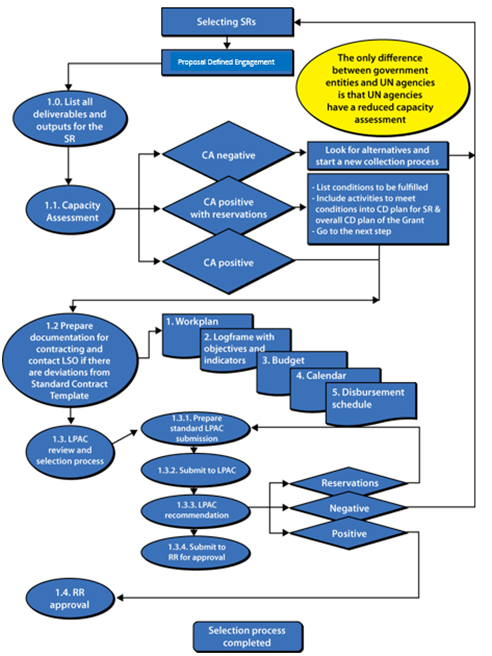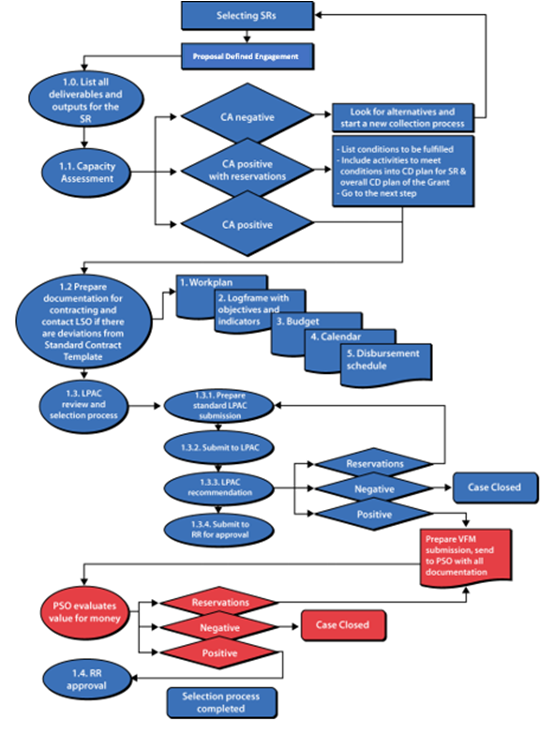-
Functional Areas
- Audit and Investigations
-
Capacity development and transition, strengthening systems for health
- A Strategic Approach to Capacity Development
- Capacity Development and Transition - Lessons Learned
- Capacity development and Transition Planning Process
- Capacity Development and Transition
- Capacity Development Objectives and Transition Milestones
- Capacity Development Results - Evidence From Country Experiences
- Functional Capacities
- Interim Principal Recipient of Global Fund Grants
- Legal and Policy Enabling Environment
- Overview
- Resilience and Sustainability
- Transition
-
Financial Management
- CCM Funding
- Grant Closure
- Grant Implementation
- Grant-Making and Signing
- Grant Reporting
- Import duties and VAT / sales tax
- Overview
- Sub-recipient Management
-
Grant closure
- Overview
-
Steps of Grant Closure Process
- 1. Global Fund Notification Letter 'Guidance on Grant Closure'
- 2. Preparation and Submission of Grant Close-Out Plan and Budget
- 3. Global Fund Approval of Grant Close-Out Plan
- 4. Implementation of Close-Out Plan and Completion of Final Global Fund Requirements (Grant Closure Period)
- 5. Operational Closure of Project
- 6. Financial Closure of Project
- 7. Documentation of Grant Closure with Global Fund Grant Closure Letter
- Terminology and Scenarios for Grant Closure Process
- Human resources
- Human rights, key populations and gender
-
Legal Framework
- Agreements with Sub-recipients
- Agreements with Sub-sub-recipients
- Amending Legal Agreements
- Implementation Letters and Performance Letters
- Language of the Grant Agreement and other Legal Instruments
- Legal Framework for Other UNDP Support Roles
- Other Legal and Implementation Considerations
- Overview
- Project Document
- Signing Legal Agreements and Requests for Disbursement
-
The Grant Agreement
- Grant Confirmation: Conditions Precedent (CP)
- Grant Confirmation: Conditions
- Grant Confirmation: Face Sheet
- Grant Confirmation: Schedule 1, Integrated Grant Description
- Grant Confirmation: Schedule 1, Performance Framework
- Grant Confirmation: Schedule 1, Summary Budget
- Grant Confirmation: Special Conditions (SCs)
- Grant Confirmation
- UNDP-Global Fund Grant Regulations
-
Monitoring and Evaluation
- Differentiation Approach
- Monitoring and Evaluation Components of Funding Request
- M&E Components of Grant Implementation
- Monitoring and Evaluation Components of Grant Making
- Overview
- Principal Recipient Start-Up
-
Health Product Management
- Compliance with the Global Fund requirements
- Distribution
- Inspection and Receipt
- International freight, transit requirements and use of INCOTERMS
- Inventory Management
- Overview
- Pharmacovigilance
- Product Selection
- Quality monitoring of health products
- Quantification and Forecasting
- Rational use
- Risk Management for PSM of health products
-
Sourcing and regulatory aspects
- Development of List of Health Products
- Development of the Health Procurement Action Plan (HPAP)
- Guidance on donations of health products
- Health Procurement Architecture
- Local Procurement of health products
- Other Elements of the UNDP Procurement Architecture
- Procurement of non-pharmaceutical Health Products
- Procurement of Pharmaceutical Products
- Submission of GHSC CO Procurement Request Form
- Storage
- Supply Planning of Health Products
- UNDP Health PSM Roster
- Waste management
- Grant Reporting
-
Risk Management
- Introduction to Risk Management
- Overview
- Risk management in crisis settings
-
Risk Management in the Global Fund
- Additional Safeguard Policy
- Challenging Operating Environment (COE) Policy
- Global Fund Review of Risk Management During Grant Implementation
- Global Fund Risk Management Framework
- Global Fund Risk Management Requirements During Funding Request
- Global Fund Risk Management Requirements for PRs
- Local Fund Agent
- Risk management in UNDP
- Risk Management in UNDP-managed Global Fund projects
- UNDP Risk Management Process
- Sub-Recipient Management
UNDP Country Office Review
For Sub-recipients (SRs) selected through a procurement process (i.e. strategic selection), the UNDP Country Office (CO) should submit the SR agreement and accompanying documents to the appropriate UNDP procurement committee (the Contract, Asset and Procurement (CAP) Committee, Regional Advisory Committee on Procurement (RACP) or the Advisory Committee on Procurement (ACP) for review. The different levels of UNDP procurement committees review actions on the basis of the total value of commitments in the engagement. There are model SR agreements for use with SRs in Global Fund programmes, agreed on with the Global Fund. Any substantive departures from these model SR agreements should be approved by the Global Fund/Health Implementation Support Team for programmatic issues and by the Legal Office (LO) for legal issues.
If it is not clear whether the change to the SR agreement template is substantive, the UNDP CO should contact the UNDP Global Fund/Health Implementation Support Team for guidance.
If the proposed commitment is below $50,000, the Resident Representative (RR) or a delegate of the RR reviews and approves the SR agreement, and no further committee review is necessary. If the commitment is between $50,000 and up to the Delegated Procurement Authority (DPA), the SR agreement is reviewed by the local CAP. If it is between the DPA and up to $2 million, the engagement is reviewed by the RACP; and if it is above $2 million, it is reviewed by the HQ ACP. For direct contracting, the CAP review is mandatory for the range $50,000 and up to 50 percent of the DPA. Any amounts between 50 percent of the DPA and $2 million are reviewed by the RACP.
When providing the SR agreement for approval, the UNDP CO should include comments from the chairperson of the committee one level below the reviewing committee.14
CAP Committees are established by the RR in each UNDP CO to provide written advice to the RR on engagement processes. The policies covering CAP Committees are detailed in the POPP.
Once the UNDP procurement committee has reviewed and recommended the SR agreement for approval to the RR, the Regional Chief Procurement Officer or the Chief Procurement Officer, may approve the SR agreement. If the UNDP procurement committee does not recommend the SR agreement for approval, the UNDP CO is required to restart the procurement process, provided the RR, Regional Chief Procurement Officer and Chief Procurement Officer agree with this recommendation.
The Local Project Appraisal Committee (LPAC), CAP, RACP or ACP may direct the UNDP CO to negotiate some of the terms of the SR agreement with the SR. If the SR agreement is modified, it should be resubmitted to the same committee for approval (please see process in Figures 1 and 2).
Figure 1. Selecting Government and UN Agencies by Proposal Defined Engagement

Figure 2. Selecting CSOs by Proposal Defined Engagement

Loading resources
